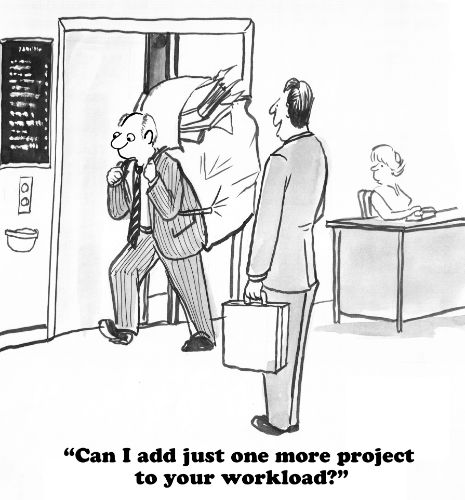Summary
If you have trouble turning down the additional workload that often falls in your lap, use these methods to help you say no.
If you have trouble turning down the additional workload that often falls in your lap, use these methods to help you say no.
Ask for Time to Consider the Request
If you’re feeling put on the spot, you have the option to counter a request with, “Can I think about it and give you an answer tomorrow?” This simple response will give you time to think through the reasons why you need to say no. You can organize your thoughts and be well prepared to give a gentle but firm no when you come back to work the following day.
Be Kind but Firm
Being kind but firm might be the most important strategy when it comes to saying no. An article written by Rebecca Knight for hbr.org states, “The manner in which you say no is so important. Don’t make the other person feel bad for asking you for help. No sighing, no grimacing, no it’s-not-my-turn-why-don’t-you-ask-Donna? Be kind, but firm. Watch your tone and your body language. Don’t shuffle your feet and don’t use facial expressions to express reluctance or demurral. Strive for a neutral no. It’s also vital that you don’t leave your counterpart with false hope that your no could eventually turn into yes. There is tremendous temptation to soften the no to get a better response. But when your no is reluctant, flexible, and malleable, it gives the impression of ‘maybe I’ll change my mind,’ and it encourages your counterpart to keep pushing. At the same time, she says, it’s reasonable to state that while the answer may be no today, things could change in the future.”
Practice
In a world of people pleasers, saying no can be extremely difficult. However, it does get easier the more you practice. Role play with a friend or family member, or write out a script for yourself. However you do it, make sure you’re comfortable with the words you’re going to say.
Acknowledge the Workload
If you have to turn down a request for help from a co-worker, it’s polite to acknowledge the workload. For example, you could say, “I know that by declining to work on this project, I’m pushing the extra workload back on you.” It’s not a perfect response but your co-worker should feel better knowing that you recognize their extra effort.

Prepare for Negative Reactions
You can do everything the ‘right way’ and still receive negative reactions when you say no to extra responsibilities. Some people don’t understand the need to have more of a work/life balance and that’s not your problem. Be prepared to potentially ‘burn bridges’ for your choice. It might not be pleasant, but your co-workers/clients will understand that you have strict boundaries when it comes to your time.
If you’re going to take on extra responsibilities at work, you should be compensated for them. However, if you need to say no, be straightforward, stay strong, and utilize the above mentioned tips.







